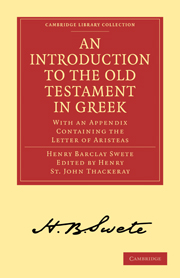Book contents
- Frontmatter
- PREFACE
- Contents
- PART I THE HISTORY OF THE GREEK OLD TESTAMENT AND OF ITS TRANSMISSION
- PART II THE CONTENTS OF THE ALEXANDRIAN OLD TESTAMENT
- PART III LITERARY USE, VALUE, AND TEXTUAL CONDITION OF THE GREEK OLD TESTAMENT
- CHAPTER I Literary use of the Septuagint by non-Christian Hellenists
- CHAPTER II Quotations from the Septuagint in the New Testament
- CHAPTER III Quotations from the Septuagint in early Christian writings
- CHAPTER IV The Greek Versions as aids to Biblical Study
- CHAPTER V Influence of the Septuagint on Christian Literature
- CHAPTER VI Textual condition of the Septuagint, and problems arising out of it
- ADDITIONS AND CORRECTIONS
- APPENDIX: THE LETTER OF PSEUDO-ARISTEAS
- INDICES
CHAPTER VI - Textual condition of the Septuagint, and problems arising out of it
Published online by Cambridge University Press: 05 August 2011
- Frontmatter
- PREFACE
- Contents
- PART I THE HISTORY OF THE GREEK OLD TESTAMENT AND OF ITS TRANSMISSION
- PART II THE CONTENTS OF THE ALEXANDRIAN OLD TESTAMENT
- PART III LITERARY USE, VALUE, AND TEXTUAL CONDITION OF THE GREEK OLD TESTAMENT
- CHAPTER I Literary use of the Septuagint by non-Christian Hellenists
- CHAPTER II Quotations from the Septuagint in the New Testament
- CHAPTER III Quotations from the Septuagint in early Christian writings
- CHAPTER IV The Greek Versions as aids to Biblical Study
- CHAPTER V Influence of the Septuagint on Christian Literature
- CHAPTER VI Textual condition of the Septuagint, and problems arising out of it
- ADDITIONS AND CORRECTIONS
- APPENDIX: THE LETTER OF PSEUDO-ARISTEAS
- INDICES
Summary
1. When the work of the Seventy-two had been accomplished, the Jews of Alexandria (so the legend goes) were bidden to invoke curses, after their manner, upon any who should dare to add to the version or take from it, or alter it in other ways (Aristeas ad fin.: ἐκέλευσαν διαράσασθαι, καθὼς ἔθος αὐτοῖς ἐστιν εἴ τις διασκευάσει προστιθεὶς ἤ μεταφέρων τι τὸ σύνολον τῶν γεγραμμένων ἤ ποιούμενος ἀφαίρεσιν). The imprecation, it has been acutely observed, may point to an early deterioration of the text of the Greek Pentateuch, which the Pseudo-Aristeas desired to check. This inference is insecure, for the story is sufficiently explained by a reference to such passages as Deut. iv. 2, xii. 32; but it is certain that textual corruption began before the Christian era. There are traces of it in the writings of Philo, which cannot be due to blunders in Philo's own text.
E.g. in quis rer. div. her. 56 Philo quotes Gen. xv. 15 in the form now universal in MSS. of the LXX. (μετʾ εἰρήνης τραφεὶς ἐν γήρει καλῷ), adding the comment: οὐκοῦν…τὸ τέλειον γένος…εἰρήνη καὶ ἐλευθερία βεβαιοτάτη ἐντρεφόμενον κτλ. […]
- Type
- Chapter
- Information
- An Introduction to the Old Testament in GreekWith an Appendix Containing the Letter of Aristeas, pp. 478 - 497Publisher: Cambridge University PressPrint publication year: 2010First published in: 1900



